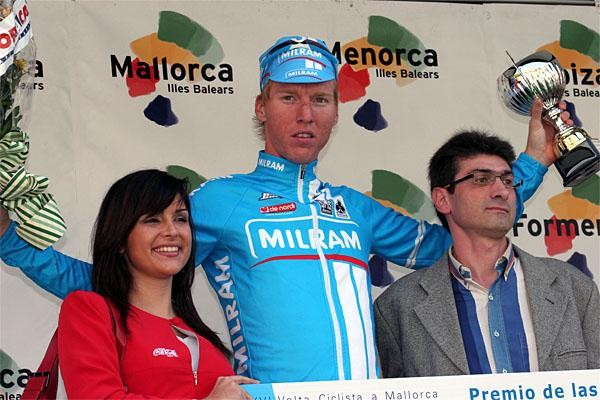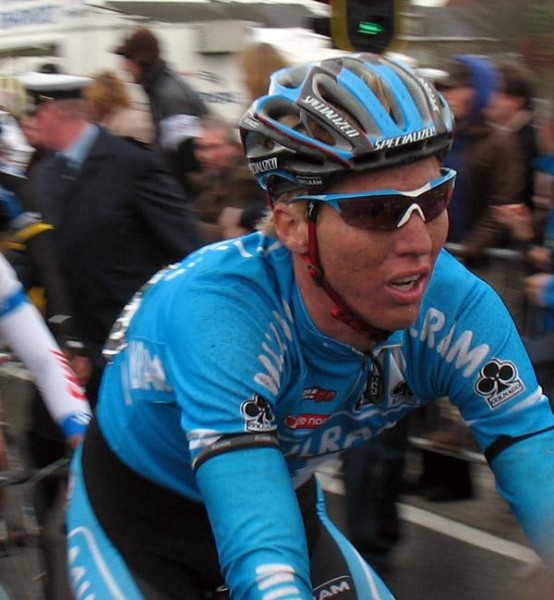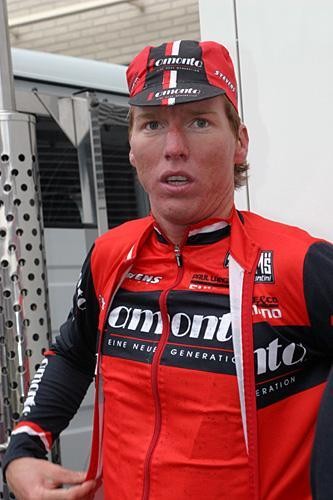The future of German Cycling: Marcel Sieberg, off to a flying start
Marcel Sieberg's first race was the Tour of Qatar, where he supported captain Alessandro Petacchi....



An interview with Marcel Sieberg, March 14, 2007
Marcel Sieberg missed much of last season with Team Wiesenhof due to mononucleosis, but still did well enough to earn himself a spot in the ProTour with Team Milram. In his first season in cycling's big league, the tall young German has managed to get off to a flying start. Cyclingnews' Susan Westemeyer caught up with the fast moving sprinter to review his first few races.
Marcel Sieberg's first race was the Tour of Qatar, where he supported captain Alessandro Petacchi. Milram finished second in the opening stage, a team time trial, allowing 24 year-old Sieberg to take the young rider's jersey, which he held for two stages.
Qatar was dominated by Quick-Step, who nearly won all the stages with Tom Boonen four and the team taking the team time trial. Milram came up a tad short in the race, taking five second places, including the time trial. But only three of those second places belonged to superstar Petacchi, the other was for Sieberg.
That was the fifth stage, where a 10-man group made a successful escape. Sieberg saw his chance and went for it. "When Wilfried Cretskens made his move 400 meters before the finish line, I could only think, oh not, not another one from Quick-Step," Sieberg said at the time. "Sure you think about winning. It could have happened. But this is something to build on."
Looking back on it, he said "Quick-Step was in the lead 800 meters before the finish and nobody followed. On the home stretch I thought something has to happen. It was a spontaneous reaction. I started and overtook the Quick-Step rider. However, then Avermaets passed me by again. Looking back, I'm a bit disappointed, and I ask myself what I could have done better."
While the second place was good for the rookie, he was there to help Petacchi win, an assignment that wasn't fulfilled. The reason for that was simple. "In Qatar, Boonen was just a bit better, just like every year." In addition, he noted, Petacchi is still missing some racing kilometers due to his various injuries from last season.
The latest race content, interviews, features, reviews and expert buying guides, direct to your inbox!
After Qatar, Sieberg went on to the Mallorca Challenge, this time in support of Erik Zabel. Again, it didn't work out for a win, but this was not the captain's fault, Sieberg said. "There are a few new riders in the team at every race, so we have to find our way together first. In Mallorca, for example, there were three new riders."
Again, Sieberg was able to do well on his own, wearing the points jersey for two days, but only until the race went up into the mountains. "I rode a bit more relaxed in Mallorca because there are a few hard races to come in the near future. Furthermore, the goal for the Mallorca Tour was to improve my condition, and I knew the hard Algarve Tour was coming up next. Petacchi was riding there and it wouldn't have been good to arrive there in a worn-out state."
The mountains simply are not the natural terrain for the 1.98 meter, 80 kg man. "I want to improve myself in the small, steep climbs that often come in spring, but I'm not a rider who will ever be at the front in high mountain regions. I want to work on my strengths rather than just try to improve my weaknesses, for it is better to be really good at one thing than just do a bit of everything."
That good form came from a lot of hard work over the winter. "This year the weather was good, so I did a lot of training outside. Every morning I was on the bike for two to three hours. I went running and to the gym three or four times a week for one to two hours."
Then he went in search of warmer places. "Like most of the German riders, I was in Mallorca in December. And I spent the whole month of January in Tuscany. I trained well there - a bit harder than usual, because this is the Italians' way of training, long and hard."
Doesn't he worry that he is in form too early? "No, because if everything works out right I will have a month's break in May. For me, it's like that every year. I'm in good condition at the beginning, then I do a little break in April. It has always worked out fine so far."
Nor does he worry that he will be tired out by the time the Classics come around. He likes doing a number of races in a row at the start of the season. "I wanted it like that and so far everything has worked out fine. I relax between the races, and we'll see how it works out. Last year I didn't do so many races before the Classics, and that wasn't good, either. Other riders do it the same way, and you have to have a certain toughness."
The form Sieberg collected in Spain helped him to propel Petacchi to three stage wins and the overall victory in Portugal, and then it was Sieberg's turn to shine in Belgium. An early mechanical took him out of the running in Omloop Het Volk, but he stormed back the next day in Kuurne-Brussels-Kuurne, finishing second behind Tom Boonen. "I actually didn't feel all that well until the finale," he said on the team's website, team-milram.de. "I worked my way up bit by bit, and two kilometers before the finish I took the left side of a traffic circle where almost everyone else went to the right."
That trick worked, and he "immediately made 10 places good, and could get on Boonen's rear wheel. I knew that when I could hold that, then not much more could happen. And that's how it worked out."
He couldn't get beyond that rear wheel, though. "Unfortunately I couldn't get around him, but I can be satisfied with a second in a sprint against Boonen. And actually the sprint was fairly relaxed, especially when you consider that I had to work my way up there by myself, while Boonen had his whole team with him."
Despite riding like a seasoned pro, Sieberg is actually still adjusting to life in the big leagues. Looking back at his first months in the ProTour, he noted that "Everything is bigger and more professional. In the past years I was in teams with 13 to 16 riders. Now there are 27 of us. There are also more physios, mechanics, etc. There there is the big truck and the big bus, which makes everything more comfortable."
The racing itself is different, too, as are his duties. "I didn't have so many duties in the last years. [Earlier this season] it was my duty to ride for Alessandro Petacchi, for example. But I knew from the start that I would have to work hard in races where there's something at stake. I used to ride a lot for myself. Now I can't do just what I want anymore because I'm fully integrated into the team's proceedings. Altogether, everything is great so far, just like I imagined it to be."
See also: Future of German Cycling: The Young Guns Part 1
